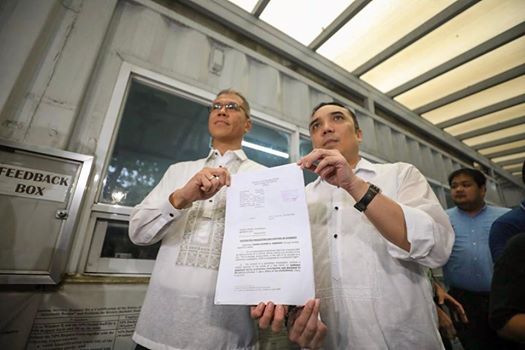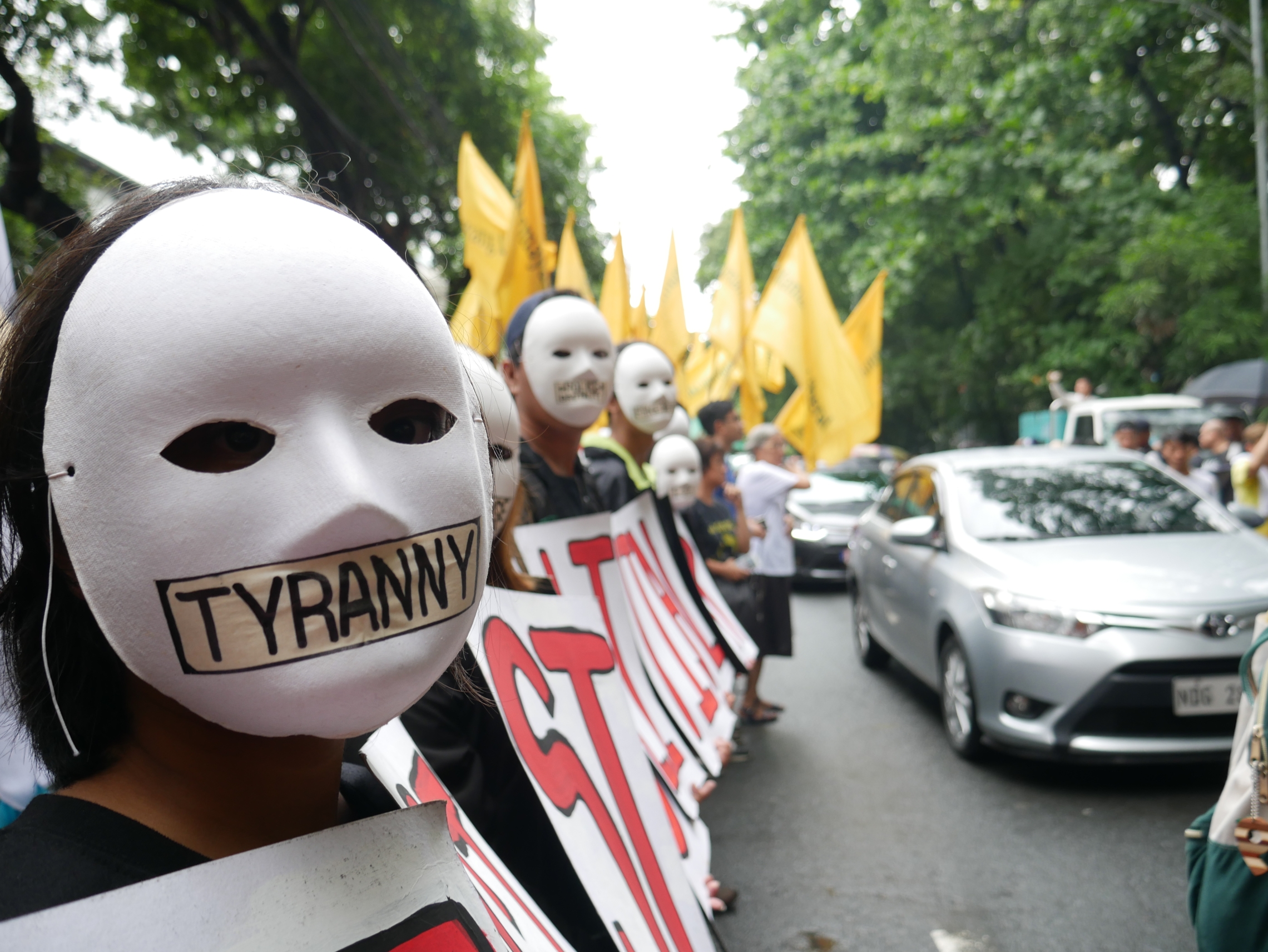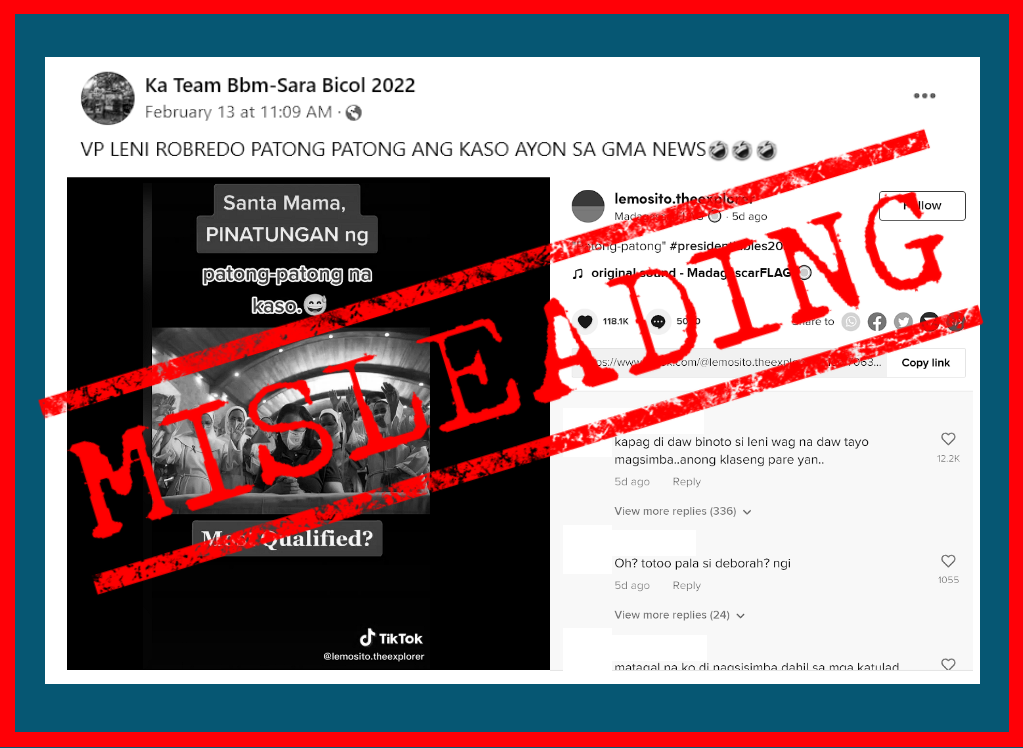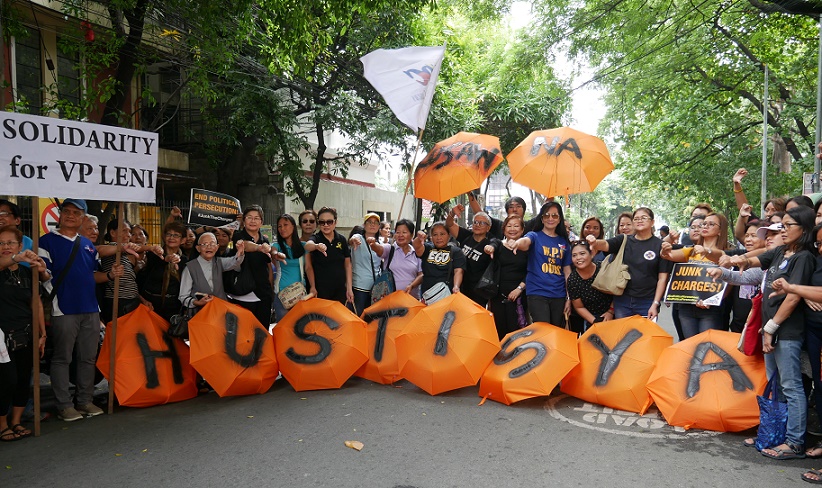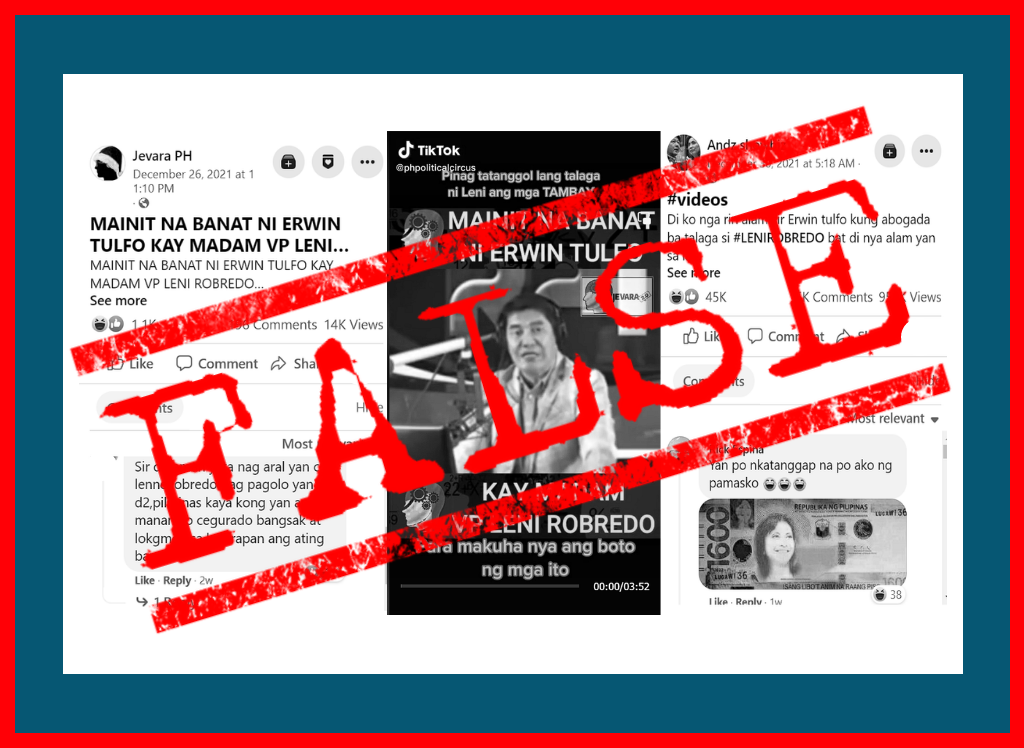The Department of Justice (DOJ) has started investigating charges of sedition, cyberlibel, harboring a criminal, and obstruction of justice against Vice President Leni Robredo and 37 other personalities.
On July 18, the Philippine National Police – Criminal Investigation and Detection Group (PNP-CIDG) formally accused Robredo and other respondents, including eight religious leaders, two former senators, and two sitting senators, of conspiring to oust President Rodrigo Duterte.
The charges were based on a July 18 sworn testimony of Peter Joemel Advincula, the self-confessed hooded man “Bikoy” in the six-part video series “Ang Totoong (The Real) Narcolist,” which linked Duterte, members of his family, and close associates to the drug trade.
PNP chief General Oscar Albayalde had previously described Advincula as an “information peddler.”
Although the complaint had already been filed, the PNP-CIDG charge sheet indicated that other witnesses and evidence/enclosures would be “presented later.” The same document said a “thorough investigation was still continuing and being conducted by the Office of the NCR-CIDG.”
Robredo and her co-respondents have denied the criminal charges, requesting government prosecutors to order the police to furnish them with copies of all evidence in the sedition complaint, among others. Withholding evidence is a violation of their rights under the Rules of Court.
But what exactly is the crime of sedition? Here are four things you need to know.
What is Sedition?
Sedition, a crime against public order in the Revised Penal Code (RPC), is committed by “persons who rise publicly and tumultuously” to attain “by force” any of the following five grounds:
- to prevent the enforcement of any law or the holding of any popular election;
- to prevent the government or any public officer from freely exercising its or one’s functions, or prevent the execution of any administrative order;
- to inflict any act of hate or revenge upon any public officer or employee, or his/her property;
- to commit, for any political or social end, any act of hate or revenge against private persons or any social class; or
- to despoil, for any political or social end, any person, municipality or province, or the national government of any part of, or all of its property.
The punishment for persons found guilty of sedition vary depending on one’s involvement, according to the RPC as amended by Republic Act 10951:
- Leader of sedition – Imprisonment of 6 years and 1 day to 8 years and a fine not exceeding P2 million; and
- Other participants – Imprisonment of 4 years, 2 months, and 1 day to 6 years and a fine not more than P1 million.
Persons who do not directly commit the crime but “incite” others to commit such through “speeches, proclamations, writings, emblems, cartoons, banners, or other representations tending to the same end” may also face imprisonment for 4 years, 2 months, and 1 day to 6 years, with a fine not more than P400,000.
Those conspiring to commit sedition, on the other hand, will be penalized with 2 years, 4 months, and 1 day to 4 years and 2 months of imprisonment with a fine of P400,000.
Conspiracy, according to law, means two or more persons who agreed and decided to commit a felony.
Sec. 6 of the Cybercrime Prevention Act states that if such crimes were committed by, through, and with the use of information and communication technologies, it will be “covered by the relevant provisions” of the Act, and the penalty imposed will be “one degree higher than that provided for by the [RPC].”
What is the difference of sedition to other crimes against public order or national security?
Here’s how the crime of sedition differs from rebellion, coup d’etat and treason:
Who can file a sedition case and which court has jurisdiction over it?
Any person can file a criminal complaint for sedition, according to lawyer Gilbert Andres of the Center for International Law Manila. A person charged with leading the commission of sedition will be tried at the Regional Trial Court (RTC):
“Kasi sabi doon sa [Batas Pambansa (BP) 129], ang jurisdiction ng Metropolitan Trial Court (MTC) ay for crimes which punishments do not exceed six years. So, ang ibig sabihin, anything about that, RTC.”
(According to BP 129, the jurisdiction of Metropolitan Trial Courts are on crimes which punishments do not exceed six years. So that means anything above that is with the RTC).”
Source: Gilbert Andres, Personal Communication, Aug. 7, 2019
Under BP 129, or the Judiciary Reorganization Act, an RTC has the right to exercise “exclusive original jurisdiction” in all criminal cases not within the jurisdiction of other courts — such as the MTC — tribunal or body, except those under the “exclusive and concurrent jurisdiction of the Sandiganbayan.”
The revised version of the law states that metropolitan, municipal, and municipal circuit courts would deal with all criminal offenses punishable with imprisonment not more than six years.
As such, those charged with inciting to, or conspiracy to commit, sedition, as well as those who participated in the crime but not necessarily led its commission, will be tried by the metropolitan, municipal, and municipal circuit trial courts.
Who have been charged or found guilty of sedition before?
The PNP-CIDG complaint against Robredo and other opposition figures is not the first sedition case against a Filipino deemed critical of the government.
Former Sen. Antonio “Sonny” Trillanes IV, also named in the 2019 PNP-CIDG complaint, is facing two more inciting to sedition charges: first, for allegedly urging soldiers to shoot Duterte for the latter’s supposed ill-gotten wealth in a 2017 privilege speech; second, for his public remarks that allegedly “instill … hatred” against Duterte after the latter voided Trillanes’ amnesty in September 2018. Both cases are still ongoing.
In 2006, columnist and University of the Philippines professor Randy David faced inciting to sedition charges for allegedly wearing an “Oust Gloria Now” T-shirt in a protest rally against then President Gloria Macapagal-Arroyo. These were dropped after the inquest prosecutor noted that:
“…David was not wearing the subject T-shirt and even if he was wearing it, such fact is insufficient to charge him with inciting to sedition.”
Source: Official Gazette, David v. Arroyo, G.R. No. 171396, May 3, 2006, May 3, 2006
Sedition cases have been filed in court as early as the American occupation in the country.
In 1923, the Supreme Court affirmed the guilty ruling against Isaac Perez, the municipal-secretary of Pilar, Sorsogon at the time, for urging his fellow Filipinos to behead then United States Governor-General Leonard Wood with bolos (machetes).
In an earlier case, however, the high court ruled in favor of several protesters who were previously found guilty of sedition by a trial court for allegedly staging an unpeaceful and disorderly protest in a municipal council in Occidental Negros. It said:
“…if the prosecution be permitted to seize upon every instance of such disorderly conduct by individual members of a crowd as an excuse to characterize the assembly as seditious and tumultuous rising against the authorities, then the right to assemble and to petition for redress of grievances would become a delusion…”
Source: LawPhil, G.R. No. L-1210, Feb. 7, 1907 and Chan Robles Law, G.R. No. L-1210, Feb. 7, 1907
Sources
Department of Justice, PNP-CIDG FILES SEVERAL CASES BEFORE THE DOJ AGAINST PROMINENT PERSONALITIES OVER PROJECT SODOMA, July 18, 2019
Philippine National Police-Criminal Investigation and Detection Group, Criminal complaint filed to the Department of Justice
Sinumpaang Salaysay (Peter Joemel Advincula), July 17, 2019
Rappler.com official Youtube channel, Albayalde: ‘Bikoy’ is information peddler, May 7, 2019
ABS-CBN News, Robredo, Trillanes, et al question sedition case evidence; DOJ defers counter-affidavit filing, Aug. 9, 2019
BusinessWorld, Robredo seeks evidence in DOJ sedition complaint, Aug. 8, 2019
Rappler.com, Robredo to DOJ: Evidence first before I respond to sedition complaint, Aug. 8, 2019
Statements of personalities named in the sedition case
- CBCP News, Bishop David: Who is breaking the law?, Aug. 6, 2019
- CBCP News, CBCP chief chides sedition charges against bishops, priests, July 20, 2019
- Antonio “Sonny” Trillanes IV, Statement, July 19, 2019
- Senate of the Philippines, Akbayan Senator Risa Hontiveros on PNP-CIDG’s sedition raps vs. opposition figures, July 19, 2019
- Senate of the Philippines, Sen. Leila M. de Lima’s statement on the Sedition Case vs the Opposition, July 28, 2019
- VP Leni Robredo, [BISErbisyong LENI – Episode 115], July 21, 2019
Supreme Court, 2000 Rules of Criminal Procedure, Dec. 1, 2000
What is sedition
- Official Gazette, Act No. 3815, s. 1930
- Official Gazette, Republic Act No. 10951
- Official Gazette, Republic Act 10175
Difference from other crimes
- Official Gazette, Republic Act No. 6968
- Lawphil, Republic Act No. 1700
- Chan Robles Law, Republic Act No. 1700
- Official Gazette, Republic Act No. 7659
Who can file sedition charges; court
- Gilbert Andres, Personal Communication, Aug. 7, 2019
- Energy Regulatory Commission, BATAS PAMBANSA BLG. 129
- Official Gazette, Republic Act 7691
Trillanes inciting to sedition cases
- Philstar.com, Inciting to sedition trial vs Trillanes to proceed, May 9, 2019
- Eagle News, Pasay court junks Trillanes’ bid to quash inciting to sedition case vs him, May 9, 2019
- UNTV, Trial on Senator Trillanes’ inciting to sedition case to proceed, May 9, 2019
- GMA News Online, Trillanes indicted anew for inciting to sedition over anti-Duterte remarks, Feb. 26, 2019
- Inquirer.net, Pasay prosecutor indicts Trillanes on 2nd inciting to sedition case, Feb. 26, 2019
- Philstar.com, Trillanes charged over remarks against Duterte during amnesty row, Feb. 26, 2019
- Eagle News, Trillanes indicted for inciting to sedition over remarks asking military to rise up vs Duterte, Feb. 27, 2019
Official Gazette, David v. Arroyo, G.R. No. 171396, May 3, 2006, May 3, 2006
Isaac Perez
- Chan Robles Law, G.R. No. L-21049
- LawPhil, G.R. No. L-21049
Filomeno Apurado, et.al.
- LawPhil, G.R. No. L-1210
- Chan Robles Law, G.R. No. L-1210
(Guided by the code of principles of the International
Fact-Checking Network at Poynter, VERA Files tracks the false claims,
flip-flops, misleading statements of public officials and figures, and
debunks them with factual evidence.
Find out more about this initiative and our methodology.)
